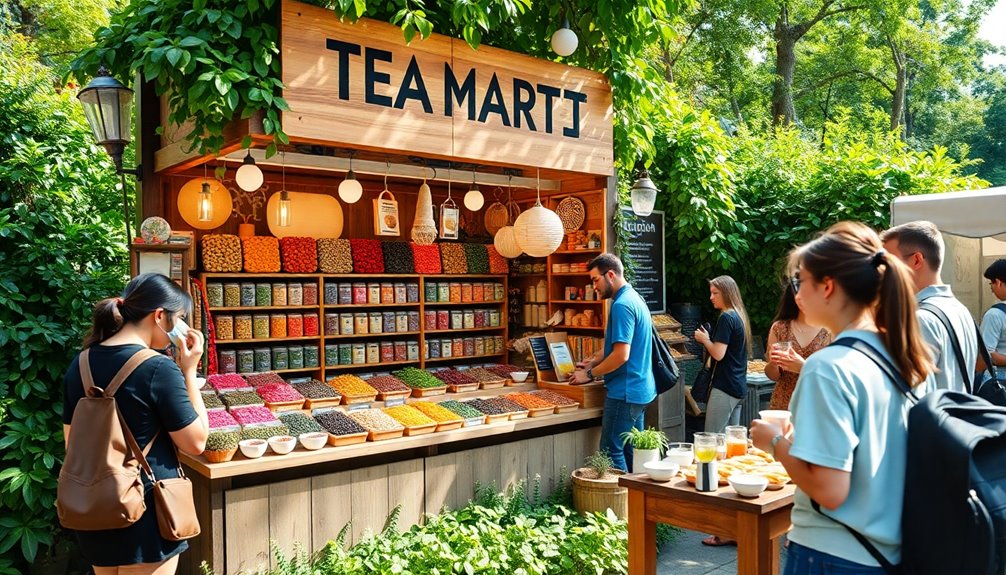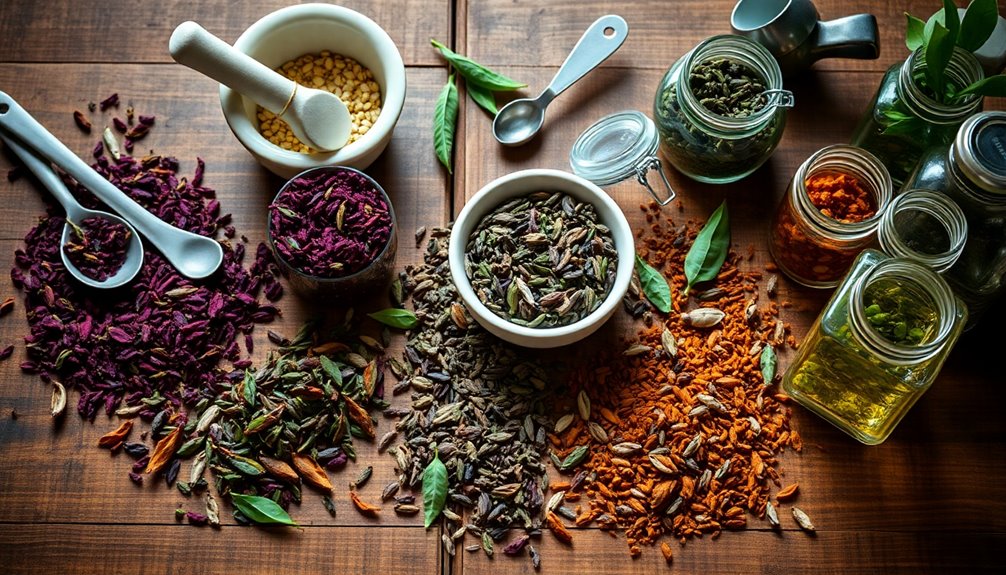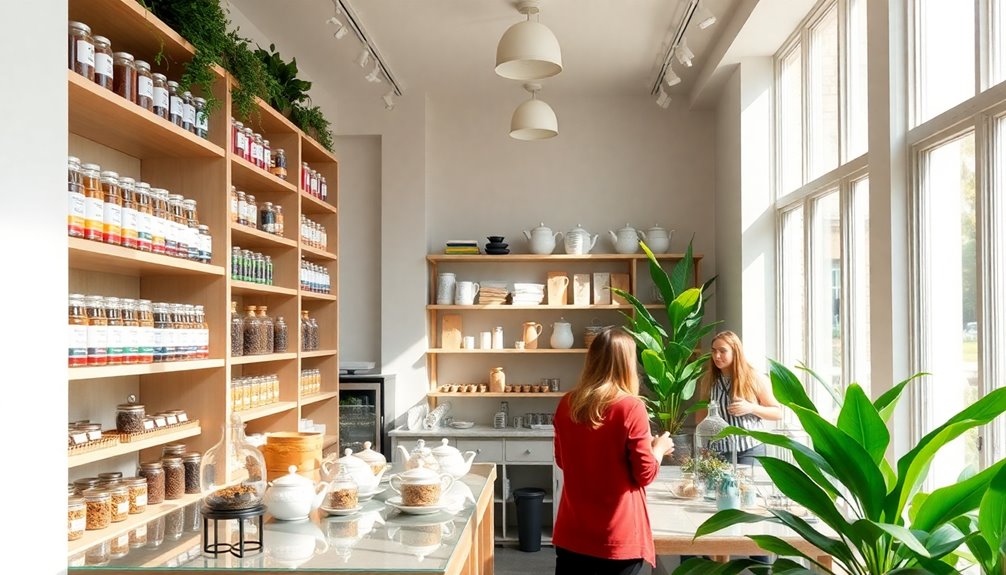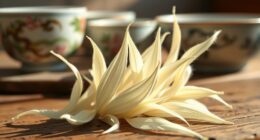In 2024, you're in for some exciting tea trends focused on health, wellness, and sustainability. You'll notice a rise in herbal teas, perfect for relaxation and health benefits. People are also choosing quality over quantity, seeking out functional blends like matcha and detox teas. Mindfulness will play a big role, with tea drinking becoming a calming ritual. Plus, ethical sourcing is more important than ever, as consumers prefer organic and fair trade options. Flavor innovation is another trend, with unique blends capturing adventurous tastes. Stay tuned to discover even more fascinating tea trends ahead!
Key Takeaways
- The global tea market is projected to reach $127.3 billion by 2024, reflecting a growing consumer interest in diverse tea options.
- Wellness-focused teas, including functional blends and lower sugar options, are increasingly popular among health-conscious consumers.
- Herbal teas will continue to rise in demand, driven by their perceived health benefits and calming properties.
- Sustainability and ethical sourcing are key priorities for consumers, favoring organic and fair trade brands.
- Innovative flavor combinations and specialty teas will attract adventurous consumers seeking unique tea experiences.
Introduction
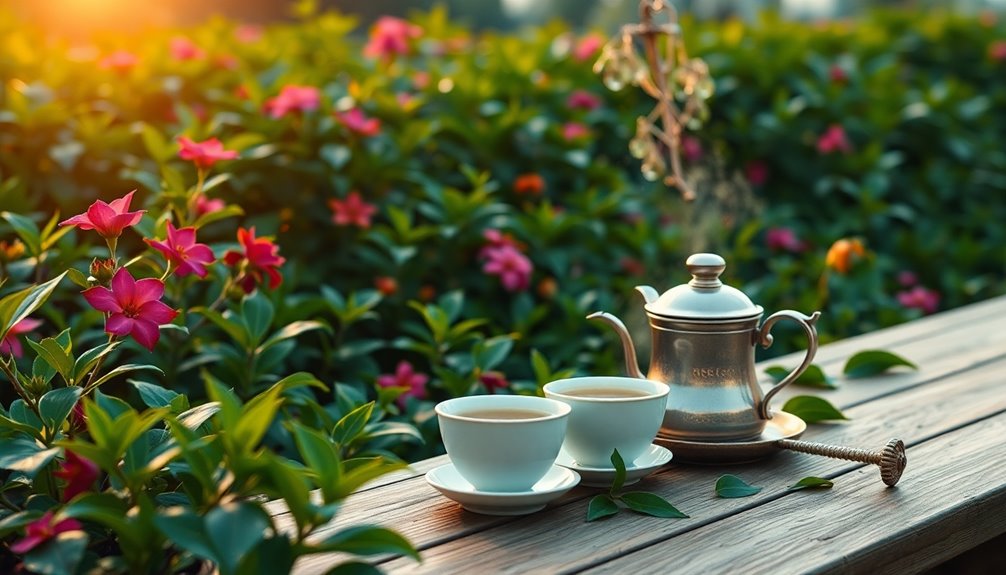
As we dive into the tea trends for 2024, it's clear that the global tea market is on the rise, projected to reach around $127.3 billion. This growth reflects a strong interest from consumers who are increasingly health-conscious. Many of you're looking for wellness-focused options, which is driving demand for specialty tea blends that offer unique flavors and health benefits.
With a volume growth of 2.3% expected by 2025, tea is gaining growing popularity worldwide. You might find yourself exploring exotic varieties, as adventurous tea experiences become more appealing. It's not just about the taste; you want teas that tell a story and provide a multi-layered experience beyond traditional offerings.
Sustainable practices are also becoming essential. As you shop for tea, consider brands that prioritize ethical sourcing and environmentally friendly options. This way, you can enjoy your tea while supporting a healthier planet.
Whether it's a soothing herbal blend or a vibrant fruit infusion, the trends in 2024 invite you to explore, enjoy, and savor every cup you drink. So, get ready to discover what's brewing in the tea world!
Consumer Health Focus Drives Trends

The health and wellness movement is reshaping the tea landscape, guiding your choices as you seek out beverages that align with your lifestyle. As you become more health-conscious, you'll notice a strong emphasis on teas that offer potential health benefits.
In 2023 and into 2024, the tea market has seen a rise in dollar sales, even if unit sales have dipped. This shift shows how you and other health-focused consumers are prioritizing quality over quantity.
You might find yourself gravitating toward functional teas, like matcha for energy or chamomile for stress relief. These teas not only taste great but also provide benefits that fit your wellness goals. Some herbal teas, such as chamomile and ginger, have been recognized for their ability to alleviate menstrual discomfort.
Traditional tea varieties are also being infused with diverse flavors, making them more exciting to drink.
Additionally, many ready-to-drink options are now lower in sugar, reflecting your preference for healthier choices. As detox teas gain popularity, it's clear that more people are becoming aware of the connection between tea consumption and overall wellness.
Increased Demand for Herbal Teas
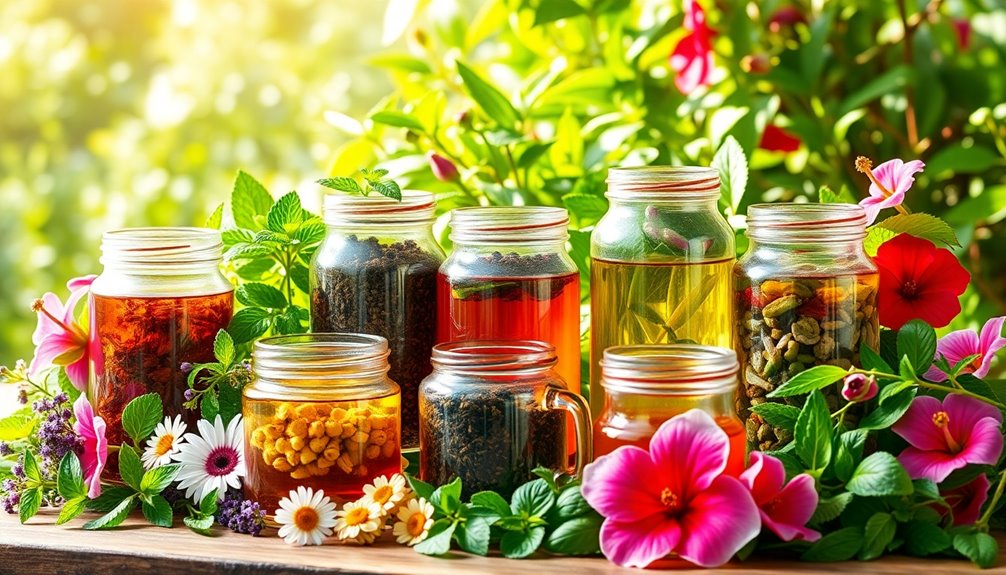
While many consumers seek out healthier beverage options, herbal teas have surged in popularity due to their perceived health benefits. You might notice the increased demand for these calming beverages as people embrace the wellness movement. Essential oils can also complement the effects of herbal teas, enhancing their soothing properties. Aromatherapy can trigger the release of neurotransmitters like serotonin that promote relaxation and emotional well-being.
Herbal teas offer a diverse range of flavors and health-focused options that cater to your needs, whether you're looking for detoxification, stress relief, or digestive support. Many herbal teas, such as flower teas, are rich in antioxidants and can support overall health.
As you explore the world of herbal teas, you'll find ingredients like ginger, chamomile, and hibiscus, which are recognized for their impressive health benefits. These caffeine-free infusions are perfect if you want a soothing drink without the jitters. Lavender oil, known for its calming properties, can also enhance the relaxing effects of these herbal blends.
Specialty tea houses are getting creative, offering unique flavors and blends that make trying new herbal teas an exciting adventure.
With many consumers prioritizing natural remedies and alternatives to sugary drinks, the market for herbal teas is set to expand even further. Additionally, the emphasis on low carbon emissions from sustainable practices enhances the appeal of herbal teas as a responsible choice for health-conscious consumers.
So, keep an eye out for new blends and flavors that can enhance your wellness journey. Embracing herbal teas not only supports your health but also brings enjoyment to your daily routine.
Get ready for a refreshing and beneficial experience in 2024!
Tea's Role in Mindfulness

Herbal teas not only offer health benefits but also play a significant role in promoting mindfulness. As you sip your favorite blend, you can enjoy the calming properties that many herbal infusions provide. These wellness rituals are gaining popularity, helping you focus on the present moment and reduce stress. Studies have shown that regular consumption of herbal teas can lower cortisol levels, alleviating anxiety and enhancing mindfulness.
When you engage in tea consumption, you're not just enjoying a drink; you're participating in a rich tea culture that celebrates relaxation and socialization. Many cafes and specialty tea houses create dedicated spaces for mindfulness practices centered around tea. You might find it easier to unwind and connect with friends as you share the experience of brewing and enjoying tea together.
This social aspect enhances the mental health benefits of tea, allowing you to feel more grounded and at ease. As you explore different blends, look for those specifically designed for their calming effects. The growing awareness of tea's role in wellness is encouraging more people to adopt these practices. Additionally, traditional tea ceremonies have been shown to deepen the experience of mindfulness, further enriching the practice of tea consumption.
Regulatory Issues in Sourcing
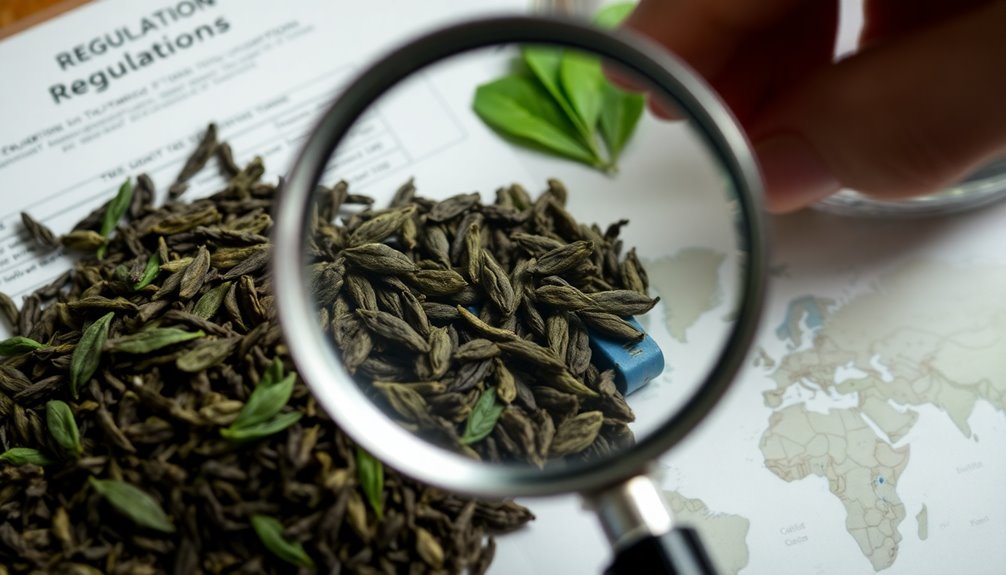
Navigating regulatory issues in sourcing tea requires understanding the complex landscape of compliance and standards. You'll need to focus on international standards for organic and fair trade certifications. These require thorough documentation and transparency in your supply chain, helping you prove that your tea is ethically sourced.
The U.S. Food and Drug Administration (FDA) has strict guidelines on labeling and safety for tea products. This impacts how you communicate sourcing practices to your customers. Additionally, increasing regulations around pesticide use are pushing tea producers to adopt sustainable practices. Consumers today want tea that's not only delicious but also responsibly sourced.
When it comes to market access, the European Union has specific rules about pesticide residue levels in tea imports. This means producers must conduct rigorous testing and monitoring to meet these standards.
Stricter trade policies in various countries can also influence pricing and availability, especially for small-scale farmers.
In this evolving landscape, staying informed about these regulatory issues is crucial. By doing so, you can ensure your tea remains compliant, appealing to the growing number of consumers who value sustainability and ethical sourcing.
Practical Applications
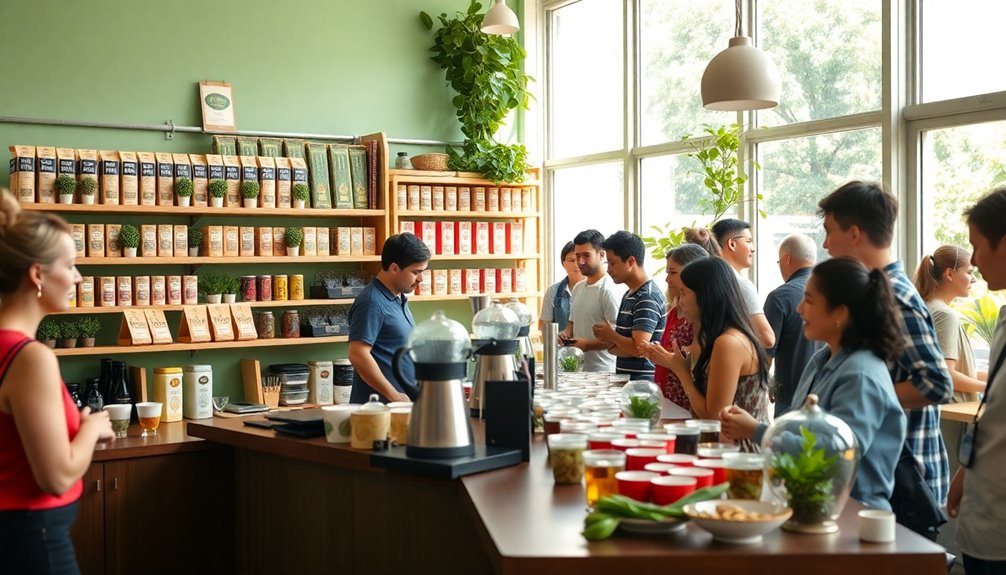
Practical applications in the tea market are evolving rapidly, allowing businesses to align with current consumer preferences.
You'll notice a growing interest in health and wellness teas, with people seeking options that offer stress relief and immunity support. Think herbal infusions like ginger and chamomile, which are becoming popular choices in tea shops. Many consumers are also turning to juice cleanses and detox programs, making tea a complementary option for their health goals. Herbal teas like chamomile are often used for calming effects, further enhancing their appeal. Additionally, the incorporation of raw food principles, such as fresh ingredients, can enhance the nutritional value of tea blends.
Ready-to-drink tea is also on the rise, projected to reach about $4.6 billion in sales. This means you can grab your favorite beverage on the go without any hassle!
Additionally, sustainable sourcing is important to shoppers today. They prefer organic and fair trade tea brands, supporting ethical consumption.
Innovative flavor combinations are catching attention too. Consumers love unique tea experiences, whether it's exotic fruit blends or traditional twists on classic teas.
Specialty tea, including wellness infusions and functional blends, is expanding, giving retailers a chance to cater to health-conscious buyers. Rooibos tea, known for its rich antioxidants, is becoming a popular choice among those seeking health benefits.
Frequently Asked Questions
What Is the Tea Trend in 2024?
In 2024, you're likely to see a rise in sustainable, wellness-focused teas. You'll enjoy unique flavors and functional ingredients, while opting for lower sugar options to support your health-conscious lifestyle. Adventure awaits in every sip!
What Is the Future of the Tea Industry?
The future of the tea industry looks promising. You'll see more health-focused options, innovative flavors, and sustainable practices. As consumers demand wellness and unique experiences, brands will adapt to meet these evolving preferences.
Why Is There a Tea Shortage in 2024?
You're facing a tea shortage in 2024 due to adverse weather affecting crops, supply chain disruptions from the pandemic, rising demand for premium blends, labor shortages, and a shift towards sustainably sourced teas. Prices are rising.
What Is the Tea Market Prediction?
You can expect the tea market to reach about $127.3 billion by 2024, with a growth rate of 2.3% by 2025. Consumers are prioritizing quality, health benefits, and sustainable practices in their purchasing decisions.
Conclusion
As we head into 2024, keep an eye on these exciting tea trends! With health-focused choices, herbal teas rising in popularity, and tea promoting mindfulness, there's something for everyone. Plus, staying informed about sourcing regulations helps us make better choices. So, whether you're sipping a calming chamomile or exploring new flavors, enjoy the journey. Embrace these trends, and let your love for tea grow while supporting your health and well-being! Happy brewing!

